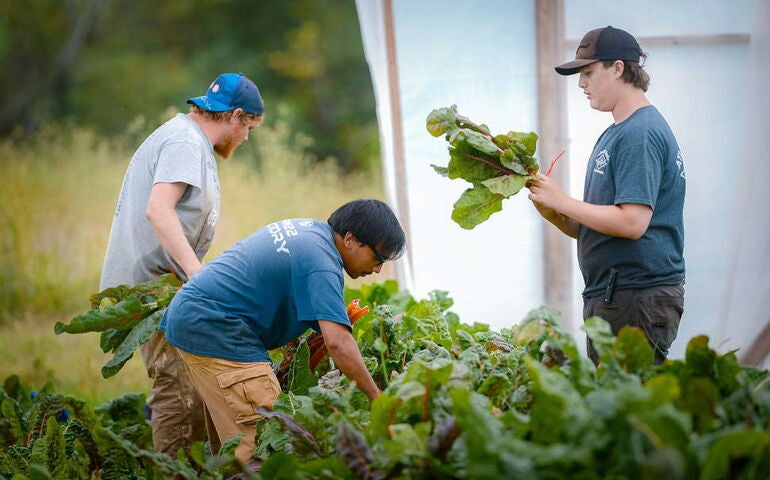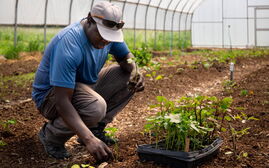Reacting to federal funding cuts, Maine food-support organizations launch fundraiser
 FILE PHOTO / FRED FIELD
Sharing produce from the farm is a key part of Mi’kmaq Farms in Caribou.
FILE PHOTO / FRED FIELD
Sharing produce from the farm is a key part of Mi’kmaq Farms in Caribou.
Seven Maine farms and food entities have come together to form a statewide collaborative fundraising initiative in the wake of federal funding cuts.
Farm to Neighbor Maine said the seven entities — Cultivating Community in Portland, Daybreak Growers Alliance in Unity, Healthy Acadia in Ellsworth, Farms for Food Equity in Cape Elizabeth, Mi’kmaq Farms in Caribou, New Roots Cooperative in Lewiston and Somali Bantu Community Association in Wales — lost funding from the U.S. Department of Agriculture's local food purchasing agreement in March.
The funding represented $1.25 million to be distributed from June 2025 through June 2028 in Maine that previously made it possible for Maine food aggregators to purchase 500,000 to 600,000 pounds of food from 75 Maine producers and distribute directly to over 200 Maine hunger relief organizations.
In Maine, 13% of Mainers are food insecure, representing over 78,000 households, and the number is growing, according to the release.
Advocacy efforts are underway to reverse the federal funding decision. But “by all known accounts, this will not happen in time for the 2025 growing season,” according to a news release.
The situation was compounded by additional funding cuts, such as money made available through the USDA’s the emergency food assistance program, to hunger relief and emergency food systems.
Fundraiser
To address the immediate need, the seven Maine producers affected by the funding freeze gathered with support from Peak Season Maine, a wholesale produce distributor in Freedom, and Full Plates Full Potential, a child nutrition organization in Brunswick, to develop a campaign and collaborative program designed to advance our shared efforts to increase access to locally grown foods.
The goal is to raise $750,000, which would allow project partners to distribute the equivalent amount of food, purchase from as many farms and supply to as many hunger relief initiatives throughout the state as in previous years of the Local Food Purchasing Assistance program.
“Our goal is to raise 30% of this total during an initial two-month-long campaign period,” says Farm to Neighbor on its website.
“Through collaborative outreach and promotion to our audiences, we seek to mobilize the public’s support. We will identify interested funders during this period whose timelines for funding may extend beyond initial launch, with the aim to secure the previously funded amount of $750,000 before April 30, 2026.”
Farm to Neighbor said the plan is to sustain the initiative past the first year. It will also be working collaboratively on farm market diversification and development to ensure long-term resiliency for farm partners.
The seven entities will serve as the distribution partnership for the initiative. Funds will be divided equitably, with each of the partners receiving 10%, with 20% of funds reserved as a discretionary fund to be utilized to buy and distribute foods, as group members deem most applicable to achieving the organization’s goals.
Another 10% will be reserved for campaign management.
Taking hits
At Liberation Farms, the termination of the USDA local food purchasing agreement affects 30 immigrant and refugee farmers who have built livelihoods with support from markets supported by $75,000 of LFPA funds annually. Liberation Farms producers provided thousands of pounds of culturally familiar crops to immigrant and refugee families through this program in Androscoggin and Cumberland counties
New Roots Cooperative is a Black- and immigrant-owned farm founded by four Somali Bantu refugee farmers in Lewiston. Loss of its LFPA grant forced it to halt its regular subsidized food box deliveries to immigrant and refugee families.
Due to loss of funding, Mi’kmaq Farms in Aroostook County will no longer be able to provide the quantity or quality of produce and fish to the local community. It will be forced to charge full price for all products to all people in order to help cover the cost of additional seed purchased that was anticipated for sowing this season and the salary of an additional full-time position that was created based on funding promised.
Last season, immigrant farmers in Portland-based Cultivating Community programs grew over $500,000 in fresh culturally familiar food for limited resource neighbors. The financing included $75,000 in local food purchasing agreement funds, $191,000 in SNAP and women, infants and children matches and $115,000 directly to local food pantries through Mainers Feeding Mainers.
Each growing season since 2021, Healthy Acadia has used the USDA funding to distribute thousands of pounds of frozen blueberries to over 30 food pantries across Hancock and Washington counties. The majority of funds went to small-scale growers to harvest and process the berries, and to freezer facilities to store berries. With the USDA cuts, the program has been eliminated for the 2025 growing season and beyond.
In 2024, Farms for Food Equity received over $70,000 through the USDA program to buy 61,000 pounds of food from 15 local farms in southern Maine and then distribute it to pantries and other food assistance programs. Funding from the local food purchasing agreement made up 20% of its budget.
For the past three years Daybreak Growers Alliance, a foods distribution company and wholesale marketplace, was a USDA funding recipient, making it possible to buy at fair market wholesale pricing from over 35 Maine farms and distribute over $500,000 of products, reaching over 100 food pantries and hunger relief organizations.
“As part of Farm to Neighbor, we are seeking to connect with employers with employee charitable giving matching programs,” Colleen Hanlon-Smith, Farm to Neighbor Maine’s campaign manager, told Mainebiz.
Reach out to Hanlon-Smith at 207-272-2128 or colleen@peakseasonmaine.com.
For more information, click here.













0 Comments